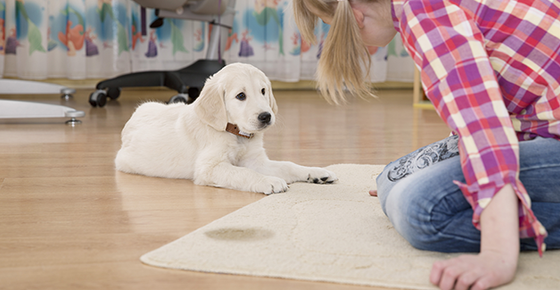
Straining to urinate, frequent urination, blood in the urine, and accidents in the house are common symptoms that pet owners report to their veterinarian. Many times the signs come on suddenly, as people find urine spots on the floor, often near the door where the dog goes outside. Cat owners may notice that the urine balls in the litter box are smaller than usual, or they may also see urine spots around the house, often in the corners of rooms. Painful urination has three main causes in dogs and cats.
Urinary Tract Infection (UTI)
A urinary tract infection (UTI), also commonly called a bladder infection, is by far the most frequent cause of a painful urination. UTI's can occur in both males and females, but infections in females are more numerous because of the shorter urethra (the tube from the bladder to the outside). To diagnose a bladder infection, your veterinarian will obtain a urine sample, collected in a special way so as not contaminate the sample, for a urinalysis and often a urine culture. E.coli is the most common bacteria causing the problem, but Staph, Proteus, Klebsiella, and Pseudomonas can be other types of bacteria causing the infection. It is believed that pets licking their anal area, then their genital area may be the means of transfer of the bacteria. Pets with extreme weakness or paralysis of the rear legs, diabetic pets, dogs with Cushings, and female dogs with a recessed vaginal opening are prone to UTI's.
Bladder Stones
Bladder stones are the second most common reason for painful urination. There are five main kinds of urinary stones with struvite (magnesium ammonium phosphate) being the most common. Other types of stones are calcium oxalate, urate, silica, and cystine. Struvite stones commonly form secondary to a bacterial infection. The other stones form because of different metabolic problems. Many, but not all, stones will show up on abdominal x-rays. Ultrasound will usually find the other stones.
Surgical removal is usually the treatment of choice for stones; this can quickly relieve the pain the pet is feeling. The main problem with stones is that they often recur. Some dogs have had multiple surgeries for stone removal. Your veterinarian can help to prevent struvite stones by performing urine cultures to monitor for UTI's. There is also a special food that may help to prevent struvite stones. The other types of stones each have their own recommendations for preventing recurrence.
Bladder Tumors
Bladder tumors are the third most common reason for painful urination. While not common, they do account for 2% of all cancers in dogs; however, they are less common in cats. The vast majority of bladder tumors are a malignancy called transitional cell carcinoma (TCC). They occur mostly in older pets. Some breeds have a higher rate of TCC, with Scotties having the highest rate since they are 18 to 20 times more likely than the average dog to have a TCC. Other breeds with a higher incidence are Shelties, Beagles, Westies, and Wire Haired Fox Terrier. These tumors cause discomfort because they obstruct the flow of urine. Detection of the tumor is by ultrasound, diagnosis is by surgery and biopsy.
If your pet is showing signs of urinary discomfort by needing to urinate more frequently than normal and straining, if you're finding urine accidents in the house, or if you see blood in your pet's urine, then consult with your veterinarian. An examination of your pet and diagnostic tests can determine the cause, and your veterinarian will discuss the necessary treatment with you.
